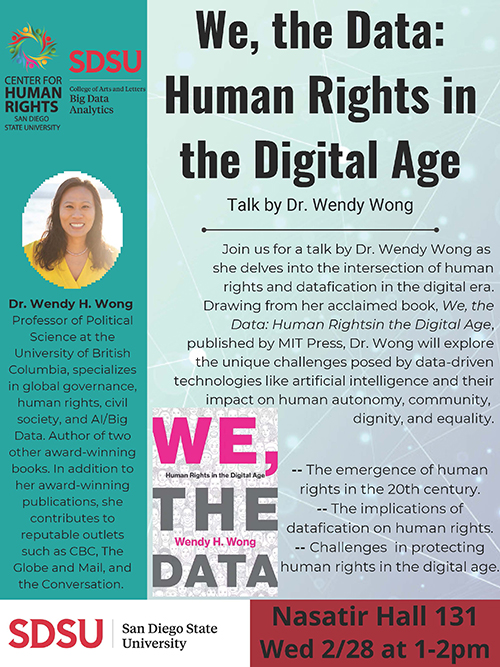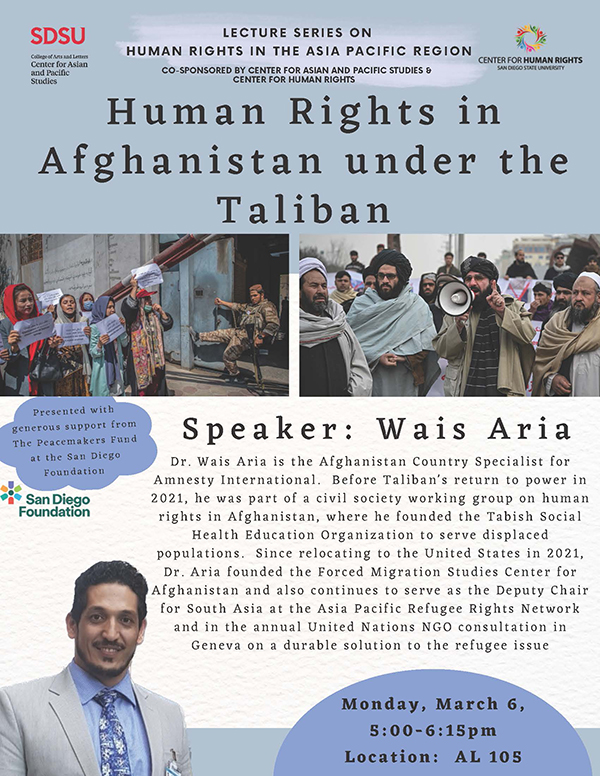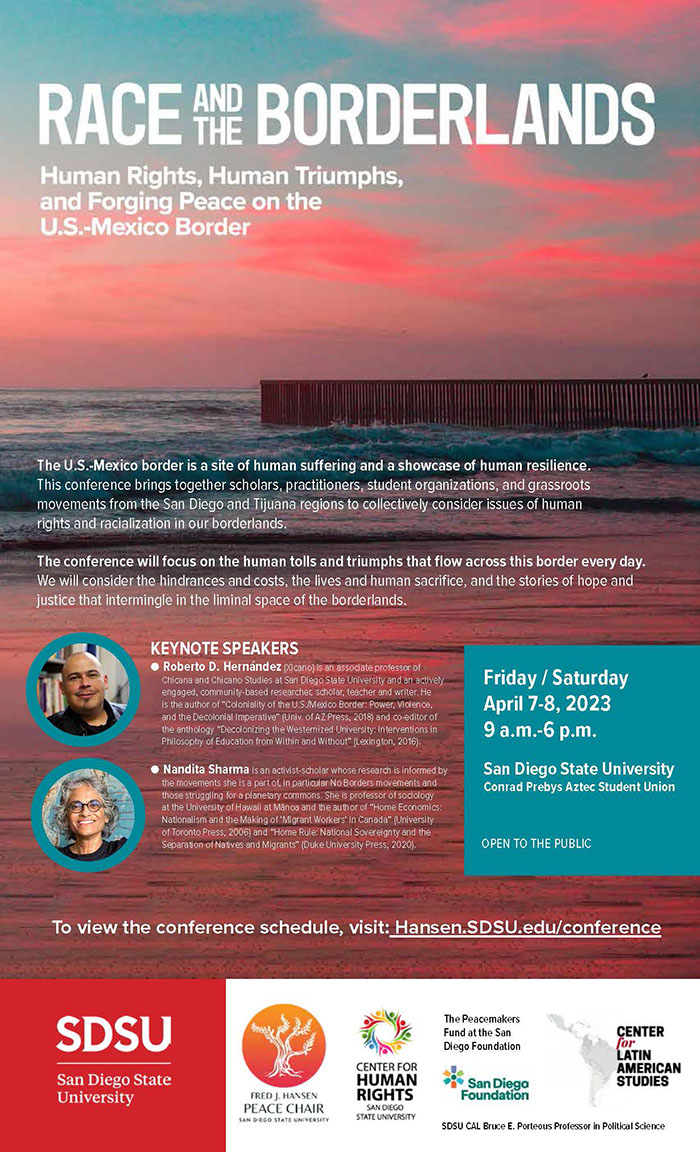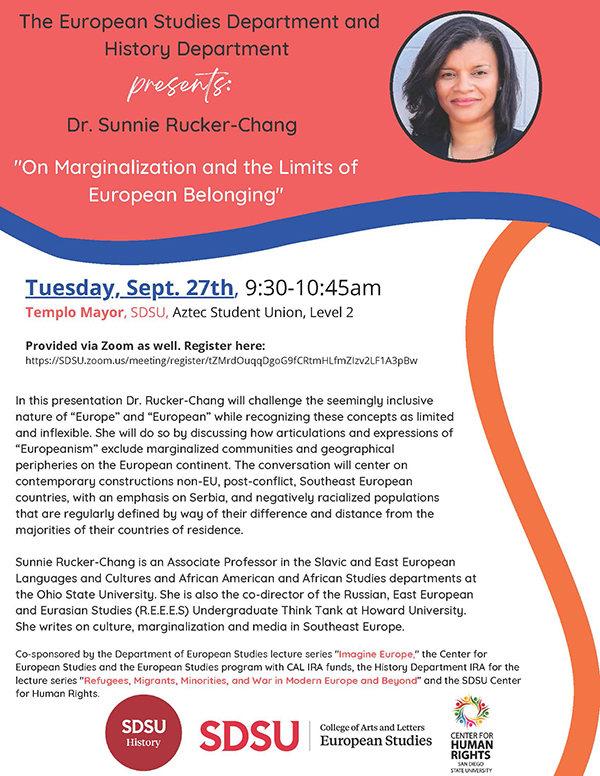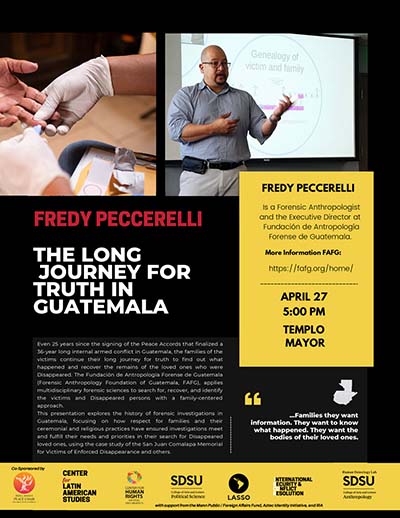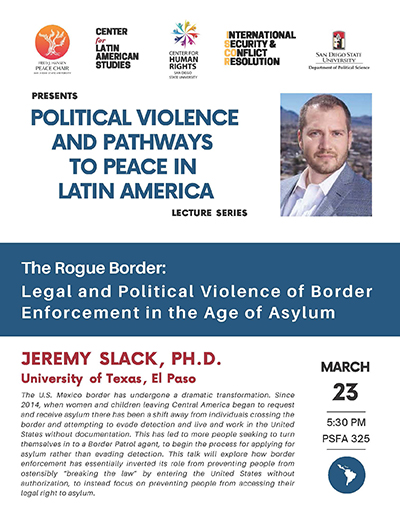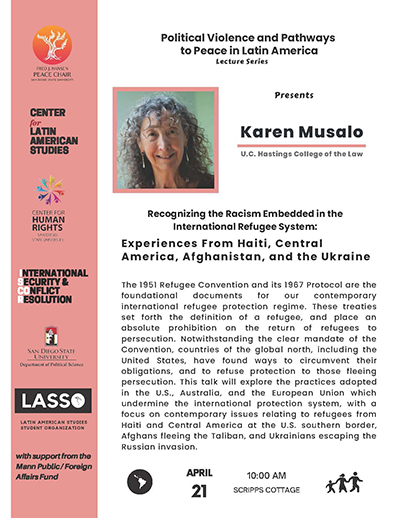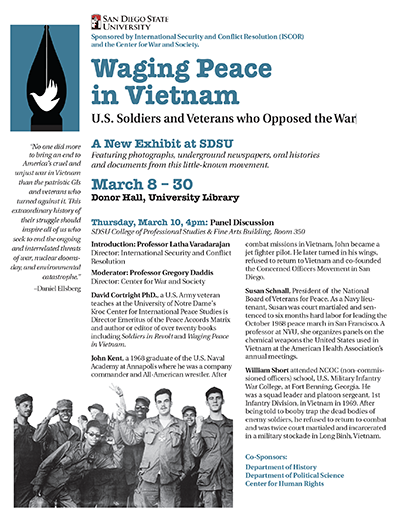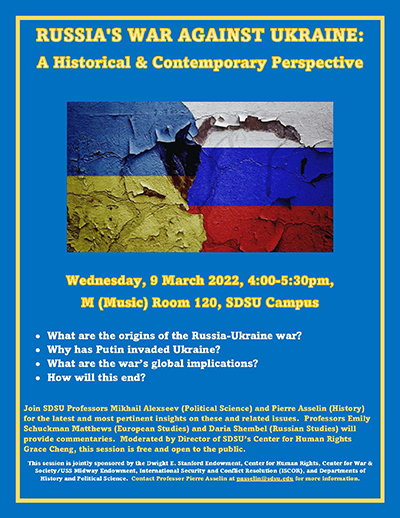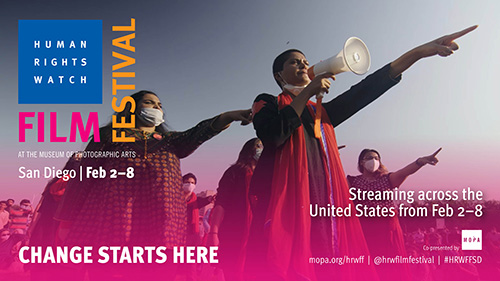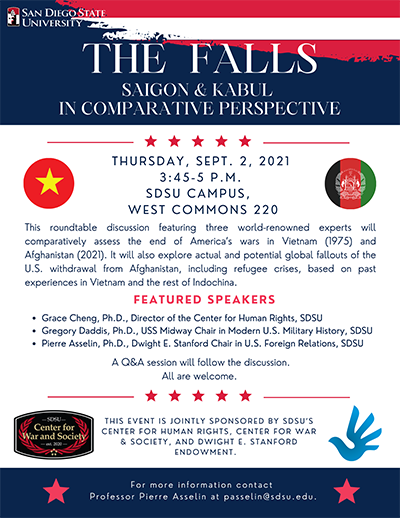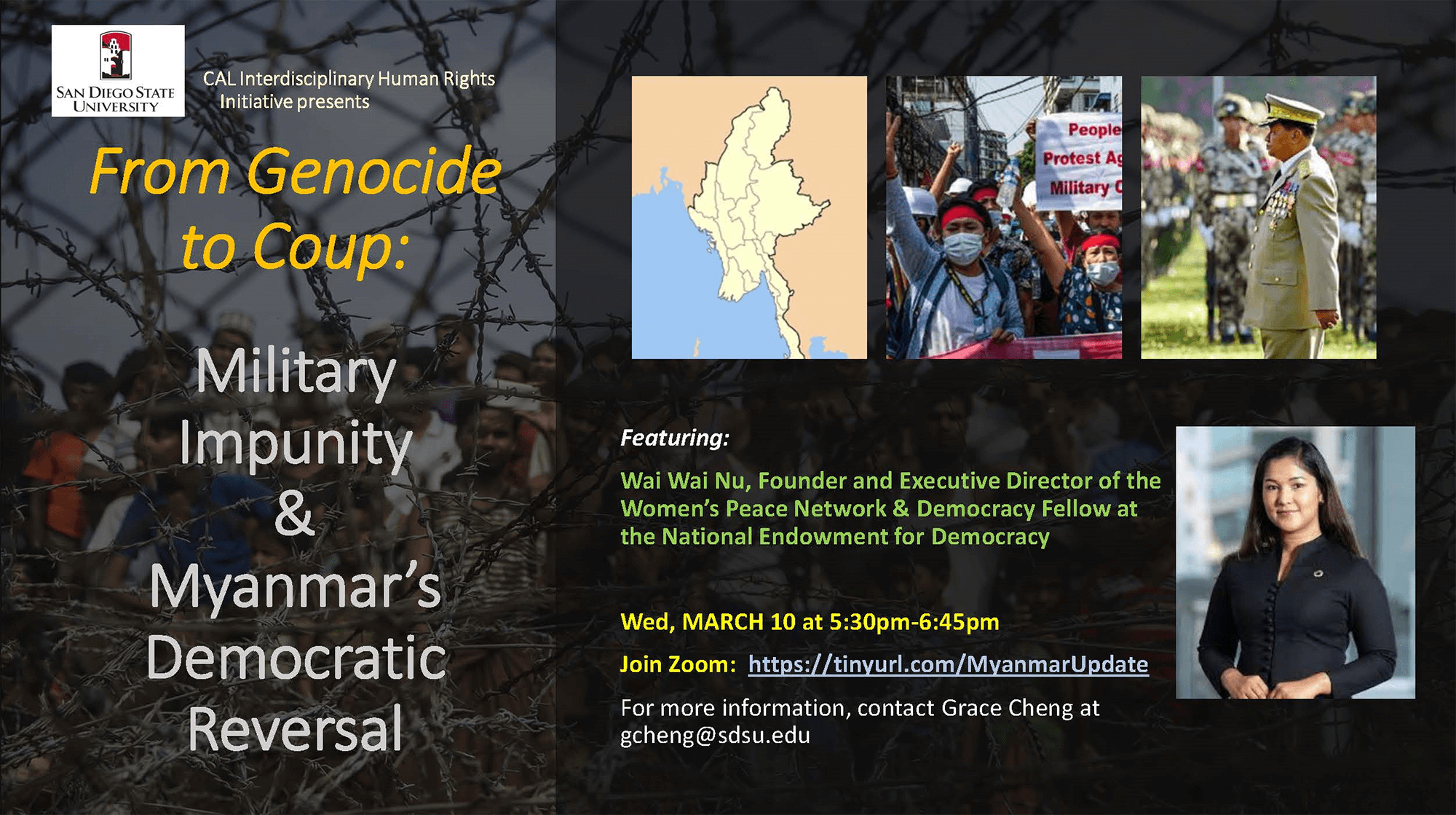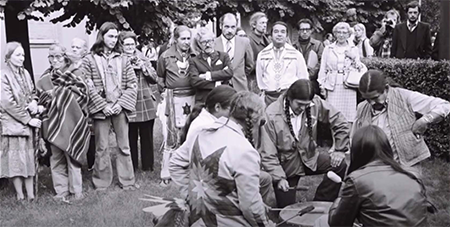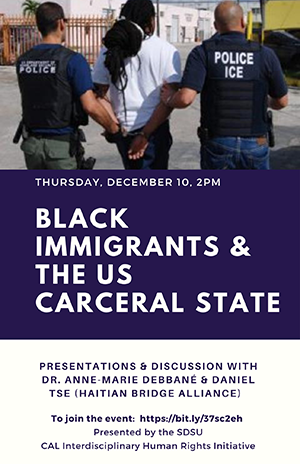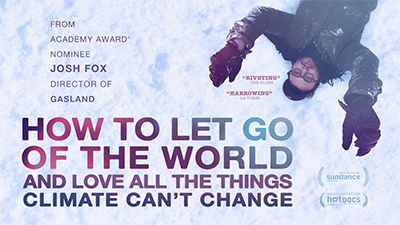
Events
The Center for Human Rights will continue to host events at SDSU, as it did as the
Interdisciplinary Human Rights Initiative (Fall 2018-Spring 2021), in partnership
with local NGOs, campus organizations, and other academic departments. These events
are geared towards bringing light to a variety of local, national, international human
rights issues in order to deepen the community's understanding of these topics.
Upcoming/Recent Events
We, the Data: Human Rights in the Digital Age
Wednesday, Feb. 28, 2024
1-2 p.m.
Location: Nasatir Hall 131
Join us for a talk by Professor Wendy Wong as she delves into the intersection of human rights and datafication in the digital era. Drawing from her acclaimed book, We, the Data: Human Rights in the Digital Age, published by MIT Press, Professor Wong will explore the unique challenges posed by data-driven technologies like artificial intelligence and their impact on human autonomy, community, dignity, and equality.
Wendy H. Wong, Professor of Political Science at the University of British Columbia,
specializes in global governance, human rights, civil society, and AI/Big Data and
is the author of two other award-winning books. In addition to her award-winning publications,
she contributes to reputable outlets such as CBC, The Globe and Mail, and The Conversation.
Past Events
Human Rights in Afghanistan under the Taliban
Lecture Series on Human Rights in the Asia Pacific Region
Speaker: Dr. Wais Aria, Amnesty International Afghanistan Country Specialist
When/where: Monday, March 6, 5:00-6:15 p.m. in AL 105
Dr. Wais Aria is the Afghanistan Country Specialist for Amnesty International. Before the Taliban's return to power in 2021, he was part of a civil society working group on human rights in Afghanistan, where he founded the Tabish Social Health Education Organization to serve displaced populations. Since relocating to the United States in 2021, Dr. Aria founded the Forced Migration Studies Center for Afghanistan and also continues to serve as the Deputy Chair for South Asia at the Asia Pacific Refugee Rights Network and in the annual United Nations NGO consultation in Geneva on a durable solution to the refugee issue.
Organized by the Center for Human Rights and the Center for Asian and Pacific Studies, with generous support from The Peacemakers Fund at the San Diego Foundation.
Race and the Borderlands Conference
April 7-8, 2023 | 9 a.m. - 6 p.m.
San Diego State University, Conrad Prebys Student Union
The U.S.-Mexico border is a site of human suffering and a showcase of human resilience. This conference brings together scholars, practitioners, student organizations, and grassroots movements from the San Diego and Tijuana regions to collectively consider issues of human rights and racialization in our borderlands.
The conference will focus on the human tolls and triumphs that flow across this border every day. We will consider the hindrances and costs, the lives and human sacrifice, and the stories of hope and justice that intermingle in the liminal space of the borderlands.
Keynote Speakers
Roberto D. Hernández (Xicano) is an associate professor of Chicana and Chicano Studies at San Diego State University and an actively engaged, community-based researcher, scholar, teacher and writer. He is the author of "Coloniality of the U-S///Mexico Border: Power, Violence, and the Decolonial Imperative" (Univ. of AZ Press, 2018) and co-editor of the anthology "Decolonizing the Westernized University: Interventions in Philosophy of Education from Within and Without" (Lexington, 2016).
Nandita Sharma is an activist-scholar whose research is informed by the movements she is a part of, in particular No Borders movements and those struggling for a planetary commons. She is Professor of Sociology at the University of Hawaii at Mānoa and the author of "Home Economics: Nationalism and the Making of ‘Migrant Workers’ in Canada" (University of Toronto Press, 2006) and "Home Rule: National Sovereignty and the Separation of Natives and Migrants" (Duke University Press, 2020).
Sponsored by the Fred J. Hansen Peace Chair, Center for Human Rights, Center for Latin American Studies, SDSU CAL Bruce E. Porteous Professor in Political Science, and The Peacemakers Fund at the San Diego Foundation.
More information at hansen.sdsu.edu/conference.
On Marginalization and the Limits of European Belonging
with Dr. Sunnie Rucker-Chang
Tuesday, Sept. 27th, 9:30-10:45am
Templo Mayor, SDSU, Aztec Student Union, Level 2
In this presentation Dr. Rucker-Chang will challenge the seemingly inclusive nature of “Europe” and “European” while recognizing these concepts as limited and inflexible. She will do so by discussing how articulations and expressions of “Europeanism” exclude marginalized communities and geographical peripheries on the European continent. The conversation will center on contemporary constructions non-EU, post-conflict, Southeast European countries, with an emphasis on Serbia, and negatively racialized populations that are regularly defined by way of their difference and distance from the majorities of their countries of residence.
Sunnie Rucker-Chang is an Associate Professor in the Slavic and East European Languages and Cultures and African American and African Studies departments at the Ohio State University. She is also the co-director of the Russian, East European and Eurasian Studies (R.E.E.E.S) Undergraduate Think Tank at Howard University. She writes on culture, marginalization, and media in Southeast Europe.
Co-sponsored by the Department of European Studies lecture series "Imagine Europe," the Center for European Studies and the European Studies program with CAL IRA funds, the History Department IRA for the lecture series "Refugees, Migrants, Minorities, and War in Modern Europe and Beyond” and the SDSU Center for Human Rights
Political Violence and Pathways to Peace in Latin America Lecture Series
This series of 3 public lectures features experts on political violence and strategies for the guarantee of human rights and peacebuilding in Latin America and in the U.S.-Mexico Borderlands. The talks all give accounts of the implications of political violence, the connections between the long- term effects of war to the migrant crises of today, and ways in which local communities organize and respond to efforts for justice and peace.
Freddy Peccerelli (Forensic Anthropologist and the Executive Director at Fundación de Antropología Forense de Guatemala)
April 27 | 5 PM | Templo Mayor
The Long Journey for Truth in Guatemala
Even 25 years since the signing of the Peace Accords that finalized a 36-year long internal armed conflict in Guatemala, the families of the victims continue their long journey for truth to find out what happened and recover the remains of the loved ones who were Disappeared. The Fundación de Antropología Forense de Guatemala (Forensic Anthropology Foundation of Guatemala, FAFG), applies multidisciplinary forensic sciences to search for, recover, and identify the victims and Disappeared persons with a family-centered approach.
This presentation explores the history of forensic investigations in Guatemala, focusing
on how respect for families and their ceremonial and religious practices have ensured
investigations meet and fulfill their needs and priorities in their search for Disappeared
loved ones, using the case study of the San Juan Comalapa Memorial for Victims of
Enforced Disappearance and others.
Jeremy Slack, Ph.D. (University of Texas, El Paso)
March 23 | 5:30 PM | PSFA 325
The Rogue Border: Legal and Political Violence of Border Enforcement in the Age of Asylum
The U.S. Mexico border has undergone a dramatic transformation. Since 2014, when women
and children leaving Central America began to request and receive asylum there has
been a shift away from individuals crossing the border and attempting to evade detection
and live and work in the United States without documentation. This has led to more
people seeking to turn themselves in to a Border Patrol agent, to begin the process
for applying for asylum rather than evading detection. This talk will explore how
border enforcement has essentially inverted its role from preventing people from ostensibly
“breaking the law” by entering the United States without authorization, to instead
focus on preventing people from accessing their legal right to asylum.
Karen Musalo, Ph.D. (U.C. Hastings College of the Law)
April 21 | 10 AM | Scripps Cottage
Recognizing the Racism Embedded in the International Refugee System: Experiences From Haiti, Central America, Afghanistan, and the Ukraine
The 1951 Refugee Convention and its 1967 Protocol are the foundational documents for
our contemporary international refugee protection regime. These treaties set forth
the definition of a refugee, and place an absolute prohibition on the return of refugees
to persecution. Not withstanding the clear mandate of the Convention, countries of
the global north, including the United States, have found ways to circumvent their
obligations, and to refuse protection to those fleeing persecution. This talk will
explore the practices adopted in the U.S., Australia, and the European Union which
undermine the international protection system, with a focus on contemporary issues
relating to refugees from Haiti and Central America at the U.S. southern border, Afghans
fleeing the Taliban, and Ukrainians escaping the Russian invasion.
Sponsored by The Fred J. Hansen Peace Chair and Center for Human Rights, with support
from the Center for Latin American Studies, ISCOR, and Department of Political Science
Waging Peace in Vietnam: U.S. Soldiers and Veterans who Opposed the War
A National Endowment for the Humanities “Dialogues of War” Workshop Series
A New Exhibit at SDSU
March 8-30
Donor Hall, University Library
Featuring photographs, underground newspapers, oral histories and documents from this little-known movement.
Panel Discussion
Thursday, March 10, 4 pm
Professional Studies & Fine Arts (PSFA) Building, Room 350
Introduction: Professor Latha Varadarajan
Director: International Security and Conflict Resolution
Moderator: Professor Gregory Daddis
Director: Center for War and Society
David Cortright Ph.D., a U.S. Army veteran teaches at the University of Notre Dame's Kroc Center for International Peace Studies is Director Emeritus of the Peace Accords Matrix and author or editor of over twenty books including Soldiers in Revolt and Waging Peace in Vietnam.
John Kent, a 1968 graduate of the U.S. Naval Academy at Annapolis where he was a company commander and All-American wrestler. After combat missions in Vietnam, John became a jet fighter pilot. He later turned in his wings, refused to return to Vietnam and co-founded the Concerned Officers Movement in San Diego.
Susan Schnall, President of the National Board of Veterans for Peace. As a Navy lieutenant, Susan was court martialed and sentenced to six months hard labor for leading the October 1968 peace march in San Francisco. A professor at NYU, she organizes panels on the chemical weapons the United States used in Vietnam at the American Health Association’s annual meetings.
William Short attended NCOC (non-commissioned officers) school, U.S. Military Infantry War College, at Fort Benning, Georgia. He was a squad leader and platoon sergeant, 1st Infantry Division, in Vietnam in 1969. After being told to booby trap the dead bodies of enemy soldiers, he refused to return to combat and was twice court martialed and incarcerated in a military stockade in Long Binh, Vietnam.
Sponsored by International Security and Conflict Resolution (ISCOR), Center for War
and Society, Department of History, Department of Political Science, and Center for
Human Rights.
Russia's War Against Ukraine: A Historical and Contemporary Perspective
Wednesday, 8 March 2022, 4-5:30pm
Music, Room 120, SDSU Campus
Free and open to the public.
- What are the origins of the Russia-Ukraine war?
- Why has Putin invaded Ukraine?
- What is the war’s global implications?
- How will this end?
Join SDSU Professors Mikhail Alexseev (Political Science) and Pierre Asselin (History) for the latest and most pertinent insights on these and related issues. Professors Emily Schuckman Matthews (European Studies) and Daria Shembel (Russian Studies) will provide commentaries. Moderated by Director of SDSU’s Center for Human Rights Grace Cheng.
Sponsored by the Dwight E. Stanford Endowment, Center for Human Rights, Center for War & Society/USS Midway Endowment, International Security and Conflict Resolution (ISCOR), and Departments of History and Political Science.
Contact Professor Pierre Asselin at [email protected] for more information.
Human Rights Watch Film Festival
The Center for Human Rights has partnered with the Human Rights Watch Film Festival, Digital Edition (February 2-8) to bring you a week of dynamic films & live conversations with filmmakers and human rights experts from around the world.
All films will be available to stream across the U.S. from our homes to yours. Stream anytime from February 2 – 8. - get your tickets now.
Join filmmakers and human rights watch experts for dynamic conversations online after you stream your movie at the following dates and times:
“On the Divide” - Thursday, February 3 at 5 p.m. PT
“Possible Selves” - Friday, February 4 at 5 p.m. PT
“Fruits of Labor” - Saturday, February 5 at 5 p.m. PT.
“This Stained Dawn” - Sunday, February 6 at 12 p.m. PT.
“Daughter of a Lost Bird” - Monday, February 7 at 5 p.m. PT
RSVP for the above Zoom Q&A's and to view film trailers.
International Human Rights Day
A Discussion on Global Health Equity
with Dr. Tola AI-Rousan
Dr. Tola AI-Rousan is Assistant Professor at the Herbert Wertheim School of Public Health and Longevity at UCSD. Her research focuses on health disparities through a human-rights lens by using innovative technologies to promote health and well being, particularly among vulnerable populations, including refugees, ethnic minorities, and those impacted by the criminal justice system.
Join us on December 9th@ 1:30 - 2:45pm
Sponsored by the Center for Human Rights and Refugee Aid Initiative (RAI) Student Organization at SDSU
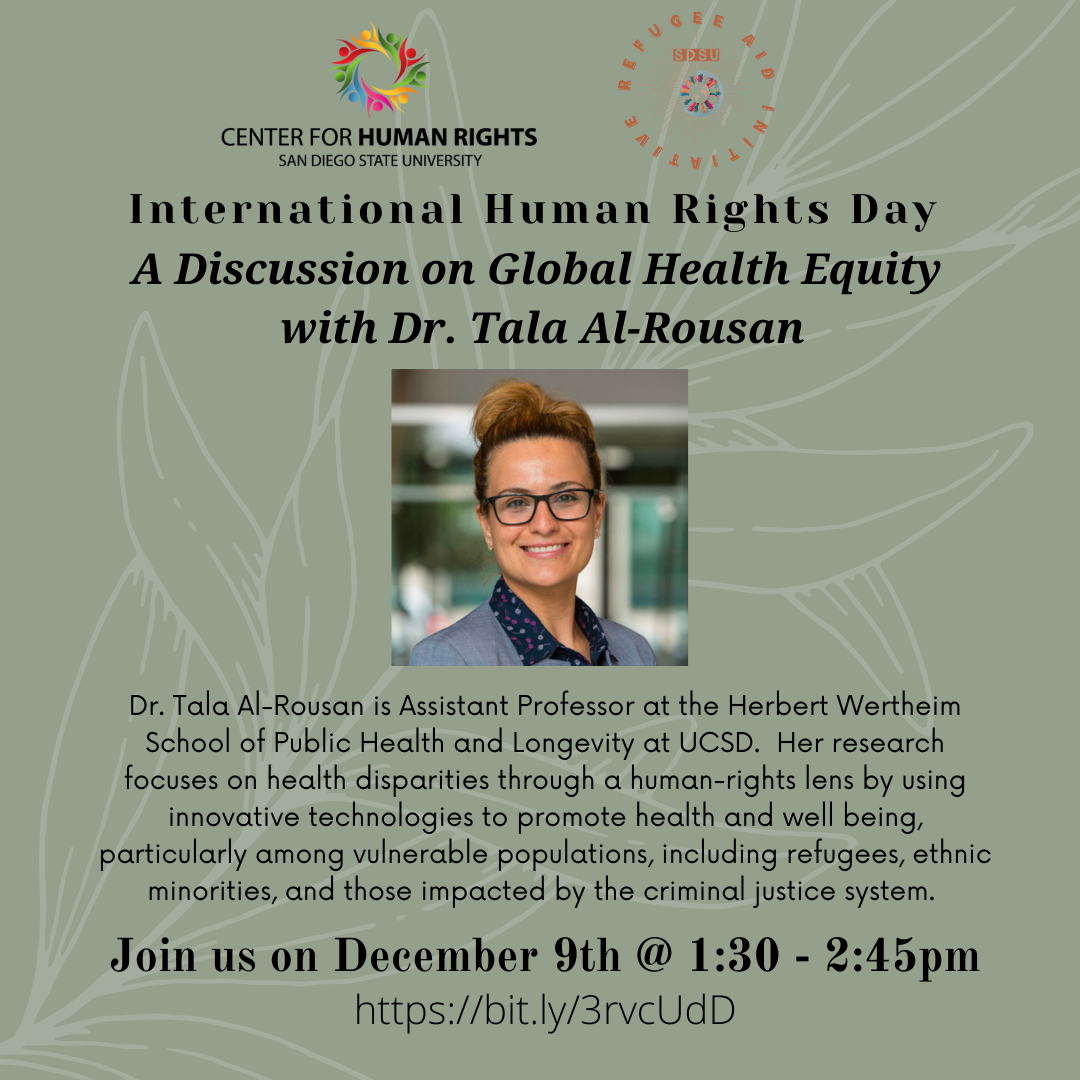
Worker's Rights in Action!
Wednesaday, December 8
5 p.m.
Storm Hall 109
Learn about your labor rights as a San Diego worker! The event will be featuring a labor rights lawyer from the Employee Rights Center and an Amazon Campaign Organizer.
Refreshments provided.
Sponsored by the Center for Human Rights, Center for Community Research and Engagement, and SDSU Department of Sociology.
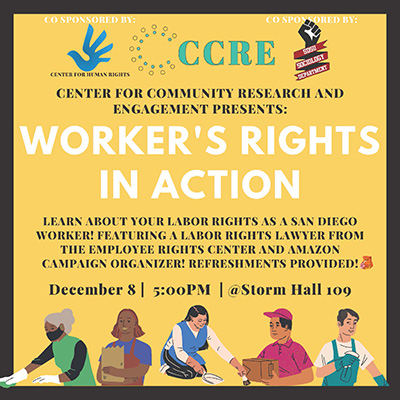
The Falls: Saigon & Kabul in Comparative Perspective
This roundtable discussion featuring three world-renowned experts will assess comparatively the end of America’s wars in Vietnam (1975) and Afghanistan (2021). It will also explore actual and potential global fallouts of the U.S. withdrawal from Afghanistan, including refugee crises, on the basis of past experiences in Vietnam and the rest of Indochina.
A Q&A session will follow the discussion.
All are welcome.
Thursday, Sept. 2, 2021
3:45-5 p.m.
SDSU Campus, West Commons 220
Featured Speakers
- Grace Cheng, Ph.D., Director of the Center for Human Rights, SDSU
- Gregory Daddis, Ph.D., USS Midway Chair in Modern U.S. Military History, SDSU
- Pierre Asselin, Ph.D., Dwight E. Stanford Chair in U.S. Foreign Relations, SDSU
For more information contact Professor Pierre Asselin at [email protected]. This event is jointly sponsored by SDSU’s Center for Human Rights, Center for War & Society, and Dwight E. Stanford Endowment.
From Genocide to Coup: Military Impunity and Myanmar's Democratic Reversal
Speaker: Wai Wai Nu, Founder and Executive Director of the Women's Peace Network and Democracy Fellow at the National Endowment for Democracy
When: Wed, March 10 at 5:30pm-6:45pm
Our guest speaker, Ms. Wai Wai Nu, will speak about developments in Myanmar, where currently there are violent crackdowns against popular protests against the military coup that took place on February 1.
Since the beginning of the brief period of civilian rule in Myanmar in 2011, the military has acted with impunity, particularly in its genocidal campaign against the ethnic Rohingya minority. While many among Myanmar's majority Buddhist population have denied that genocide has taken place, the military is now suppressing the popular will, bringing about a reversal of Myanmar's tenuous ten-year democratic transition.
About the speaker
After seven years as a political prisoner in Myanmar, Wai Wai Nu emerged as a prominent voice fighting for equal rights and democracy. Since she founded Women’s Peace Network in 2013, Ms. Nu has tirelessly fought against the political oppression, violence and genocide that’s plagued women, youth and marginalized communities, especially those from the Rakhine State.
Her continued peace building efforts have earned her national and international recognition, including Champion of Prevention by the UN Office of the Prevention of Genocide and Responsibility to Protect, Impact Hero (2019), among many others.
Ms. Nu holds a bachelor’s degree in law from the University of Yangon (Myanmar) and master’s degree in law from the University of California, Berkeley, where she was also Visiting Scholar at the Human Rights Center. She was Obama Foundation Fellow at Columbia University and held fellowships at Stanford University's Center on Democracy, Development and the Rule of Law and, most recently, at the US Holocaust Memorial Museum before her current position as Democracy Fellow at the National Endowment for Democracy.
Un Permanent Forum on Indigenous Peoples
Commemoration 20 Accomplishments for 20th Anniversary 2000 – 2020
A film screening of "Bridge to the Future" (film produced by DOCIP)
Followed by Q&A with Special Community Guest
February 18, 2021
10:00 p.m. (PST), 7:00 p.m. (Hawai'i), 1:00 a.m. (EST)
Global Human Rights and Fundamental Freedoms Festival
Indigenous People & Our Planet - Semester World Weekly Series - Movies for the Movement
Sponsors:
- SDSU CAL Center for Human Rights (IHRI) and Department of American Indian Studies
- Hawai'i Institute for Human Rights
- United Nations Association -- Honolulu, Hawai'i
- The GOOD Group
- Human Rights Hui, Hawai'i Center for Human Rights Research and Action
- The Climate Reality Project - Hawai'i
- SDSU Law, Policy, and Human Rights Student Organization
For more information contact: Joshua Cooper [email protected]
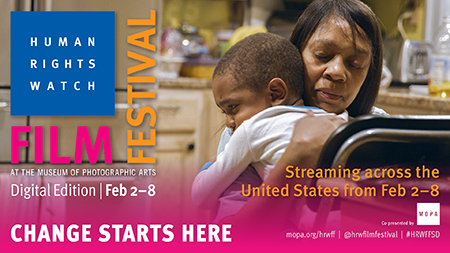 Human Rights Watch Film Festival - San Diego Digital Edition, February 2-8, 2021
Human Rights Watch Film Festival - San Diego Digital Edition, February 2-8, 2021
The IHRI is proud to serve as a community partner of the Human RIghts Watch (HRW) Film Festival in San Diego. The HRW Film Festival brings five compelling films via virtual screenings you can view any time between February 2 and 8, as well as live discussions with filmmakers, journalists, human rights advocates and researchers on specific dates.
For film descriptions, tickets, and to reserve spaces at the live Q&A sessions, visit www.hrwfilmfestivalstream.org.
Black Immigrants in the US Carceral State
Thursday, December 10, 2020 at 2pm
Please join us for this panel presentation/discussion in celebration of Human Rights Day.
The panel will feature Daniel Tse from the Haitian Bridge Alliance and Dr. Anne-Marie Debbane from the Free Them All SD Coalition. In addition, students will share snippets from letters they've received from refugees held in US detention centers.
The Trump Administration is attempting to accelerate the deportation of refugees from African and Caribbean countries. Numerous complaints reveal a pattern of coercion and physical abuse to force Black immigrants to sign papers agreeing to deportations, which will return them to countries where they fled persecution and violence.
Virtual Film Screening: How to Let Go of the World and Love All the Things Climate Can't Change
Friday, September 25 at 4pm
In How to Let Go of the World and Love All The Things Climate Can't Change, Oscar Nominated director Josh Fox (GASLAND) continues in his deeply personal style, investigating climate change – the greatest threat our world has ever known. Traveling to 12 countries on 6 continents, the film acknowledges that it may be too late to stop some of the worst consequences and asks, what is it that climate change can’t destroy? What is so deep within us that no calamity can take it away?
Co-sponsors: CAL IHRI and Department of American Indian Studies
Virtual Film Screening: Yanoaka
Friday, September 18 at 4pm
Yanoaka: A documentary on the first-ever world gathering of indigenous leaders, from Australia, Africa, Brazil, New Zealand, Indonesia, and the Philippines.
Join the film at https://bit.ly/32hMz61
Implementing the UN Declaration on the Rights of Indigenous Peoples
Monday, September 15, 2020 at 5:30 pm (Eastern Time)
Hear first hand accounts of indigenous leaders pursuing self determination at the United Nations as we observe the 13th anniversary of UNDRIP's adoption.
Virtual Film Screening: Awake, A Dream from Standing Rock
SDSU Human Rights Initiative and Hawai'i Institute for Human Rights presents a virtual film screening of Awake, A Dream from Standing Rock on Friday, September 11 at 4 pm.
Guests are welcome to participate in a live chat beginning at 3:30 pm PT and watch the livestream film screening beginning promptly at 4 pm PT.
Undocumented Migration Project
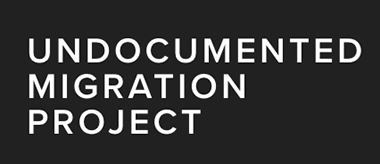 The Undocumented Migration Project (UMP) is a long-term anthropological study of clandestine
movement between Latin America and the United States that uses ethnography, archaeology,
visual anthropology, and forensic science to understand this violent social process
and raise awareness through research, education, and public outreach.
The Undocumented Migration Project (UMP) is a long-term anthropological study of clandestine
movement between Latin America and the United States that uses ethnography, archaeology,
visual anthropology, and forensic science to understand this violent social process
and raise awareness through research, education, and public outreach.
Hostile Terrain 94 (HT94) is a participatory art project sponsored and organized by the Undocumented Migration Project (UMP), a non-profit research-art-education-media collective, directed by anthropologist Jason De León. The exhibition is composed of ~3,200 handwritten toe tags that represent migrants who have died trying to cross the Sonoran Desert of Arizona between the mid-1990s and 2019. These tags are geolocated on a wall map of the desert showing the exact locations where remains were found. This installation will simultaneously take place at a large number of institutions, both nationally and globally in 2020.
Events:
TVirtual Toe Tag Filling Sessions
Hosted by St. OlafSt. Olaf College has developed virtual programming for Hostile Terrain 94 (HT94)! On Tuesday, July 14th the St. Olaf College HT94 Executive Committee Members will host the first public Zoom Webinar where participants can learn more about migrant death at the U.S./Mexico border, the history of HT94 and violent U.S. immigration policies, and fill out toe tags for the exhibition. Each toe tag represents a migrant who has died trying to cross the Sonoran Desert of Arizona between the mid-1990s and 2019. The next webinar will take place on Tuesday, July 21, starting at 7 pm (CDT). The webinars are a space of remembrance, reflection and advocacy.
Official Virtual Launch of Hostile Terrain 94
The School for Advanced Research (SAR), in collaboration with SITE Santa Fe and the Center for Contemporary Arts Santa Fe (CCA), presents Beyond Borders, a series of installations beginning in the summer of 2020. Beyond Borders makes its groundbreaking global debut on July 17th, 2020, with a virtual opening of our very own HT94. The opening will include an online introduction, virtual tour of the exhibition, and discussion with HT94 Head Curator and UMP Director, Jason De León and the UMP team.
Border South: A Talk with Jason De León & Raúl O. Paz Pastrana
Every year hundreds of thousands of migrants make their way along the trail running from southern Mexico to the US border. In Raúl O. Paz Pastrana’s film, Border South, migrant stories of resilience and survival are woven together from different vantage points, exposing a global migration system that renders human beings invisible in life as well as death. On Friday, July 24th at 7pm MDT, Border South filmmaker Raúl O. Paz Pastrana will be joined by the film's producer and advisor, Jason De León, in an online discussion. CCA will provide a streaming link to view 72 hours before the scheduled online discussion. Participants will be able to ask questions.
A Moment of Global Remembrance Participation Extension!
Over 2,000 volunteers are still needed to participate in a Moment of Global Remembrance on August 11th. This public awareness initiative seeks to memorialize the lives of the more than 3,200 individuals who have died while crossing the Sonoran Desert of Arizona since the 1990's as a direct result of U.S. border enforcement policies. We are asking for people to volunteer to read out loud the name, age, date of recovery, and cause of death for one person memorialized in HT94. Each recording will be compiled together into one single video of thousands of voices around the world. By dedicating just a few minutes of your time, you can take part in this powerful moment of witnessing. Learn how to get involved.
Film Screening and Live Q&A: Border South
The SDSU Hostile Terrain 94 Organizing Committee is hosting a FREE screening of Border South on August 13th and 14th. For more information contact IHRI Director Grace Cheng at [email protected].
Following the screening, there will be a live Zoom Q&A with Jason De León and our team at 2pm on the 14th.
The Contradiction of Increased Enforcement: Crime, Immigration, and the Security of Local Communities
Wednesday, April 8 - 5:40pm: Professor Benjamin Gonzalez-O'Brien
Since taking office, Donald Trump and his administration have pushed aggressive immigration enforcement policies they claim make communities safer by deporting dangerous immigrants, but does the data support this? In this talk Dr. Benjamin Gonzalez O'Brien will explore the narrative of immigrant criminality and its inherent fallacies, as well as the costs of aggressive immigration enforcement to both immigrant communities and the cities/states they live in. Drawing on his two books, Handcuffs and Chain Link: Criminalizing the Undocumented in America and Sanctuary Cities: The Politics of Refuge (with Loren Collingwood), as well as work by other researchers, Dr. Gonzalez O'Brien with shed light on why aggressive enforcement is bad policy, both at the local and national level.
US (Non-) Compliance with International Human Rights Law Obligations with Regard to Refugees and Asylum-Seekers
Wednesday, April 22 - 5:40pm: Professor Grace Cheng
International human rights law obligates states to protect the rights of refugees and migrants. The United States Government has adopted policies and practices that are not in compliance with these laws. the Migrant Protection Protocols (MPP); limitations on access to asylum; family separation and the rights of children; indefinite detention of asylum seekers; prosecution of immigraton-related offenses; and harassment and intimidation of immigration lawyers and journalists. Based on a report to the UN Human Rights Council jointly written with various international law and human rights organizations, Dr Cheng will discuss the human rights dimensions of these policies and practices.
Event sponsored by IHRI, Border Angels at SDSU, and the Law, Policy, and Human Rights (LPHR) Student Organization
The Land Development Program of the Republic of Vietnam in the Central Highlands (1957-1961)
Wednesday, March 11, 3-5pm
Gateway Center Room 1504, SDSU Campus
Ho Thanh Tam, PhD. -- Vietnam National University, Hanoi (VNUH)
In 1957, the government of Ngo Dinh Diem implemented the Land Development Program in South Vietnam. A core policy to rebuild the nation after the Franco-Vietminh War, the Land Development program moved nearly 70,000 people, mainly farmers from coastal central provinces and some from the North, to the Central Highlands. Owing to insufficient facilities, human resources, and expertise, the program stagnated and was abolished after five years. The conflict over land ownership and religion between the settlers/migrants and indigenous ethnic communities, a lasting consequence of the Land Development program, disrupted life in the Central Highlands. That, in turn, undermined trust in the South Vietnamese government and proved an asset for the Communists seeking to reunify Vietnam under their own authority.
This talk is sponsored by the CAL Center for Human Rights (IHRI) and the Dwight E. Stanford Endowment. It is free and open to the public.
Film Screening of City Rising: The Informal Economy
Friday, March 6, 2020 at 3:30-5pm
Arts and Letters (AL) Room 101
Discussion following film with co-producer Pascale Joassart-Marcelli, SDSU Professor of Geography
CITY RISING: The Informal Economy examines a growing segment of our economy, which consists of unregulated and unprotected jobs. It exposes this trend as the result of policy choices and practices that have historically kept many jobs out of reach for women, immigrants and people of color who have turned to the informal economy to make a living and support their communities. The film follows workers in California who labor off the books – often in plain sight— and are organizing to find pathways to legalization and protection.
The CITY RISING Series, produced by KCET in collaboration with the California Endowment, is a multi-platform initiative that highlights how individuals facing social and environmental injustice fight to change policy and lift up their communities.
Sponsored by the Geography Colloquium Series. Co-sponsored by the Departments of Economics, Political Science, and Sociology, the Center for Human Rights, & the Interdisciplinary Urban Studies Program
Panel Discussion: Academic Freedom - Perspectives of U.S. and International Scholars
Monday, March 2, 2020 at 7 PM
International Student Center
Academic freedom is the indispensable requisite for unfettered teaching and research in institutions of higher education.
"The common good depends upon the free search for truth and its free exposition"
--1940 Statement of Principles on Academic Freedom and Tenure, American Association
of University Professors
Academic freedom is threatened in the U.S. and internationally. In 2019, the Scholars at Risk Network reported 324 attacks on higher education communities in 56 countries (www.scholarsatrisk.org). Panelists from SDSU are joined by two Visiting Scholars at Risk, who are teaching at UCSD and SDSU.
Participants
Mark Freeman (Moderator) is a professor in the School of Theatre, Television and Film. He is past chair of the Senate Freedom of Expression Committee.
Grace Cheng is Director of the College of Arts and Letters Center for Human Rights. She also teaches courses in Political Science, as well as The History of Human Rights at SDSU. Dr. Cheng was a founding member and the first President of the Association of American University Professors chapter at the university where she previously taught.
Jonathan Graubart is a professor of international relations and former director of ISCOR. His areas of research are international law, transnational activism, the UN, and Israel-Palestine. His current book project is entitled, "How Zionism Failed and How it can be Transformed: Lessons from Arendt, Buber and the pre-state Jewish dissenter." Prof. Graubart has organized multiple lecture series over the years, some of which have provoked great controversy.
Dilsa Deniz is a Kurdish scholar from Turkey and a Visiting Scholar at Risk UCSD. She is an anthropologist and has worked extensively as an activist and organizer in women’s movement in Turkey. Her research focuses on the cultural and religious practices in Kurdish communities. After signing a peace petition, she was dismissed from her position in Turkey. Unable to work, she was forced to leave the country.
Nihat Celik is a Visiting Scholar at Risk Public Affairs SDSU. He was an assistant professor of political science at a private university in Turkey, which was closed by the government. Along with other academic and administrative staff of his university, he was charged with membership in a terrorist organization. After being arrested and imprisoned, he was released, but forbidden to travel and blacklisted. Prof. Celik’s main research areas are foreign policy analysis, diplomatic history and Middle East politics.
Mark Wheeler is Chair of the Philosophy Department, Director of the SDSU Institute for Ethics and Public Affairs, and Chair of the University Senate. He pursues research in ancient Western philosophy, contemporary value theory, and contemporary metaphysics. In the larger community, Professor Wheeler is an active member of the Summit Unitarian Universalist Fellowship, and he is president of a non-profit organization that develops sustainable educational resources in Southern Africa.
Sponsors
Senate Freedom of Expression Committee
Institute for Ethics and Public Affairs
Center for Human Rights
International Security and Conflict Resolution
International Student Center
Amnesty International Priority Campaigns
Thursday, January 30
11am-12:30pm
Scripps Cottage
Amnesty International (AI) is an organization devoted to investigating and exposing human rights violations around the world.
Please join us to learn more about the organization and its 2 priority campaigns in the US: migration rights and why gun violence is a human rights issue.
The Right to Seek Asylum: Migrant Stories of their Struggles to Find Human Rights, Dignity, and Peace in the United States
Tuesday, December 10 - International Human Rights Day
12:30-1:45pm
Scripps Cottage
A report by the ACLU Foundation of San Diego & Imperial Counties and SDSU Center for Community Research and Engagement
With remarks from: Jill Esbenshade, PhD (SDSU Professor of Sociology, Center for Community Research and Engagement), Monika Langarcia (ACLUF-SDOC Immigrants' Rights Attorney), and SDSU Student Researchers: Martin Ibarra, Yvette Lorona, Giovani Mejia, and Monica Wong.
Over the past year, families fleeing life-threatening violence and persecution in their home countries have faced a barrage of controversial new challenges and barriers to seeking asylum protection in the United States. When federal government began releasing asylum-seeking migrants onto San Diego streets without warning or resources, the San Diego Rapid Response Network (SDRRN) acted quickly and compassionately to provide temporary shelter and services. In a year’s time, the SDRRN Migrant Family Shelter provided humanitarian aid to more than 18,000 people exercising their human and legal right to seek asylum protection in the U.S. (November 1, 2018 – October 31, 2019) . To document their arrivals and first experiences in U.S. custody, SDSU/CCRE and ACLUF-SDIC carried out 350 surveys and 64 in-depth interviews.
We will share their challenges, experiences and stories with you on December 10.
Co-sponsored with the Department of Sociology’s Center for Community Research and Engagement and Latin American Studies Students Organization (LASSO).
Socially Conservative Gender and Sexuality Regimes: Threats to Democracy and Human Rights
Friday, November 22
11am-12pm
Nasatir Conference Room
Political Science Colloquium with Professor Cheryl O'Brien
Apocalypse Still: Agent Orange in 21st Century Vietnam
Tuesday, November 19
7pm
West Commons 201
Anne Xuan Nguyen, FNRS Aspirant Fellow, Université Libre de Bruxelles
Drawing from her field trips and research on the long term consequences of Agent Orange pollution and health effects in Vietnam and the United States, Anne Xuan Nguyen (ULB-FNRS) will look at the long-term consequences of the Vietnam War/American War in the 21st century.
Free and open to the public
Funded by the Dwight E. Stanford Endowment and hosted by the Center for Military Studies, Phi Alpha Theta, Center for Asian and Pacific Studies, and the CAL Center for Human Rights (IHRI).
Chile Awakens: Why are Latin American Protesting Now?
Tuesday, November 12
5:30pm
Adams Humanities 2108
Chilean scholars Mia Dragnic (PhD candidate, University of Chile) and Cézar Pérez (PhD candidate in Spanish, SUC) will explain what is happening in their country. Both have worked as professors in Chile and are prominent public intellectuals in their country.
For more information contact: Matías Beverinotti [email protected] or Pablo Ben [email protected]
Sponsored by Department of Spanish and Portuguese, Department of History, Center for Latin American Studies, Phi Alpha Theta.
State Violence and Mass Incarceration in Brazil: The Precarity of Black Lives in the Bolsonaro Era
Thursday, October 3
5:00 pm-7:00 pm
Hardy Tower (HT) 140
A Conversation with activists Nana Oliveira and Isadora Salomão about state violence and mass incarceration in Brazil.
Co-Sponsored with the Behner Stiefel Center for Brazilian Studies, Department of Africana Studies, Department of Women’s Studies, Black Studies Project at UC San Diego
Fleeing Genocide: Insights from Rohingya refugee camps in Bangladesh
Thursday, October 10
7:00 pm-9:00 pm
Arts and Letters (AL) 101
Learn about the Rohingya history and the event that triggered the mass flight of refugees in August 2017 to Bangladesh. Karen Jungblut, Director of Global Initiatives USC Shoah Foundation explains the aftermath of the migration and what the Rohingya and Bangladeshi face today.
Co-sponsored with the Mann Endowment for Public Policy and Foreign Affairs, Department of Political Science, and Center for Islamic and Arabic Studies.
Human Rights and Migration at a Crossroads
Tuesday, October 29
4:00 pm-6:30 pm
Location TBD
Come hear from local organizations about their work, the impacts of refugee and migration policies on human rights, and ways to get involved.
Politics Regarding the LGBTQ Community
Tuesday, April 30th 5-7pm
Located at Templo Mayor (Student Union)
Ben Cartwright, Director of Community Outreach for the San Diego LGBT Community Center, will speak about policies regarding the LGBTQ community. Ben Cartwright. As an avid advocate for LGBTQ rights, Cartwright will discuss the importance of health policy and how people can use policy to benefit communities.
For more information: [email protected].
Migrants in Detention
Thurs 4/18, 6:30-7:45pm in West Commons 201
Jennifer Gonzalez and Ivette Lorona of Detainee Allies will discuss the work and findings of the organization, which started in San Diego as a group of concerned community members meeting around a table in the Del Cerro neighborhood and has now expanded to over 250 volunteers.
Detainee Allies seeks to uphold standards of human decency and government accountability for migrants and refugees held in American immigration detention centers. They currently work with over 200 migrants and refugees in the Otay Mesa Detention Center in San Diego. This privately-contracted detention facility, run by CoreCivic, is located only 15 miles southeast of central San Diego and may be the largest refugee detention facility near a major American city.
Dr. Jose Morales - Former Dean of the Law School at National University and Vice President of the Central American Commission for the Defense of Human Rights
Roots of Immigration: Public Security Policies in El Salvador
Monday 4/15, 1-2 pm in Scripps Cottage
El Salvador’s Proposed Amnesty Law and its struggle for truth, justice, & reparation
Monday 4/15, 3-4pm in NH 229
Dr. Morales will speak about a new "national reconciliation" law, which will reverse the Supreme Court’s 2016 overturning of a sweeping amnesty law covering crimes committed during the 1980-1992 civil war.
Thousands of people had been extra-judicially executed, tortured or forcibly disappeared during the conflict, with over 75,000 killed by government forces.
Presented by the Department of Sociology & CAL Center for Human Rights. For more information, contact Grace Cheng: [email protected].
Songs of Memory and Resistance: Gabriella Ghermandi's Italian-Ethiopian Storytelling
Tuesday, March 5, 2019
11:00 A.M. Italian and Amharic | 12:30 P.M. English and Amharic
in Conrad Prebys Aztec Student Union Theatre
Italian-Ethiopian author and performer Gabriella Ghermandi will discuss her multifaceted work as writer, singer and storyteller. She is the author of the acclaimed novel Queen of Flowers and Pearls, a marvelous voyage in time and space intertwining multiple stories of resistance from the age of Italian colonialism to contemporary migrations. Originally published in Italian in 2007, it was translated in English in 2015 and in Amharic in 2017.
Gabriella Ghermandi was born in Addis Ababa, Ethiopia, her mother's land, and lived there until the late 1970s when she was forced to relocate to Bologna, her father's hometown in Italy, where she still lives. She uses storytelling and live performance to reach diverse audiences and foster mutual empathy. She is also the creator and lead singer of The Atse Tewodros Project, an artistic collaboration between Ethiopian and Italian musicians.
Co-sponsored with Circolo italiano, the European Studies Program, Dept. of European Studies, Dept. of Africana Studies, Dept. of Women's Studies, Center for Human Rights, The Center for European Studies, and Common Experience: Time.
Nicaragua's Current Human Rights Crisis
Monday, February 25, 2019
12-1pm
Arts and Letters ( AL) 132
A brown-bag presentation by Victoria González Rivera, Professor in the Department of Chicana/o Studies
For more information, please contact: Grace Cheng at [email protected]
Brazil Under Military Rule, 1964-1985
Presentation by John Martin
Tuesday, January 29,2019
11am-12:15pm
Arts and Letters ( AL) 102
About John Martin: As ABC News Correspondent from 1975 to 2002, Martin covered political events around the world. He later served on the faculty of Columbia University’s Graduate School of Journalism and is currently a public policy research fellow at the Woodrow Wilson Center. His television news reports are held at the SDSU Library Special Collections.
Co-sponsored by the CAL Center for Human Rights, J. Keith Behner and Catherine M. Stiefel Program on Brazil, Center for Latin American Studies, Department of History, and Department of Political Science.
From Hope to Hate: The Rise of Conservative Subjectivity in Brazil
Dr. Rosana Pinheiro-Machado
Thursday, January 31, 2019
11:00- 12:00
Pride Suite - Aztec Student Union, First Floor
The talk introduces the general panorama of Brazilian macro and micro politics from ‘Lula-ism’ to ‘Bolsonaro-ism’, marked respectively by the rise and fall of economic growth as well as by democratic collapse. These changes in national development have also shaped the individual self and the capacity to aspire to a better life, as well as ways of doing politics and understanding the world. An examination of these processes can help us understand how the very citizens that exemplified Brazil's rise as a global democratic power came to support military intervention and Bolsonaro.
Rosana Pinheiro-Machado is a social scientist and an anthropologist at the Federal University of Santa Maria (UFSM, Brazill). Previously, she was a lecturer at the Department of International Development at the University of Oxford and held visiting positions at University of Sao Paulo and Harvard University. Pinheiro-Machado also writes for the Intercept Brasil and her work has been featured in the Washington Post.
Co-sponsored by the J. Keith Behner and Catherine M. Stiefel Program on Brazil , Department of Political Science, Center for Human Rights, and Center for Latin American Studies.
Border Angels on Human Rights at the US-Mexico border
Monday, Dec. 10, 2018 6-7:30pm in AL 204
To commemorate the 70th anniversary of the Universal Declaration of Human Rights, join us for a conversation with Border Angels on Human Rights at the US-Mexico border.
#StandUp4HumanRights
Sponsored by the CAL Center for Human Rights and the Departments of Chicana/o Studies, Latin American Studies, Political Science, and Sociology.
Human Rights Abuses and Central American Families on the U.S. Mexico Border
Friday, November 9, 2018 12-4 PM at Scripps Cottage
Join us for this symposium featuring (in order of appearance):
- Trans and LGBTTI Migration from Honduras By Suyapa Portillo Villeda, Ph.D. Associate Professor, Pitzer College. Frequent contributor to the North American Congress on Latin America (NACLA) Report on the Americas, the Huffington Post, and other media, and author of academic articles on Honduras in multiple journals and books.
- From Obama to Trump: Constructing a Central American “Refugee Crisis” By Leisy Abrego, Ph.D. Associate Professor, UCLA. Author of the award-winning book, Sacrificing Families: Navigating Laws, Labor, and Love Across Borders (Stanford University Press, 2014)
- Minor Offenses: Children, Violence, and Refugee Migration By Ester Hernández, Ph.D. Professor, Cal State Los Angeles. Co-editor of the award-winning book, U.S. Central Americans. Reconstructing Memories, Struggles, and Communities of Resistance (The University of Arizona Press, 2017).
- The Role of "Race" and "Racial Scripts" in Understanding U.S. Response to Central American Migrants By Arely Zimmerman, Ph.D. Assistant Professor, Pomona College. Co-author of By Any Media Necessary: the New Youth Activism (NYU Press, 2016).
- Contemporary Human Rights Abuses in Nicaragua and in U.S. Asylum Policies By Victoria González-Rivera, Ph.D. Associate Professor, SDSU. Author of Before the Revolution. Women’s Rights and Right-Wing Politics in Nicaragua, 1821-1979 (Penn State University Press, 2011).
- Not your Tragic Other: Central American Solidarity, Identity, and Poetics By Maya Chinchilla, MFA. Poet and Lecturer at UC Davis. Author of The Cha Cha files. A Chapina Poética (Korima Press, 2014). Editor of the forthcoming CentroMariconadas: A Central American Queer and Trans Anthology.
- The Legacies of Genocide: (Re) Framing Maya Migration to the United States ByAlicia Ivonne Estrada, Ph.D. Professor, CSU Northridge. Co-editor of the award-winning U.S. Central Americans. Reconstructing Memories, Struggles, and Communities of Resistance (The University of Arizona Press, 2017).
Co-sponsored with SDSU Common Experience, the College of Arts and Letters Dean’s Office, the Department of Women’s Studies, the Department of History, the Department of Political Science, the Department of Sociology, the Master of Arts in Liberal Arts & Sciences, the Women’s Resource Center, and the Center for Latin American Studies.
Peace Caucus: American Public Health Association (APHA) Annual Meeting
Nov. 11-14, 2018
San Diego, CA
The Peace Caucus (Est. 1986) provides a focal point for individuals committed to social justice and creation of peace worldwide. The Caucus develops programs on the health effects of wars that illustrate the need for peaceful environments so that populations and their economies can recover and develop. APHA's Annual Meeting and Expo is the largest annual gathering of public health professionals. More than 12,000 people attend, and thousands of new abstracts are presented each year, making APHA 2018 the most influential meeting in public health.
Big Brother States in Fact and Fiction: Thoughts on China and Other Places
Wednesday, October 17, 2018 @4 PM at the International Student Center
This presentation will take the form of a public conversation in which the speakers will focus on issues of surveillance and control in not just China but also other parts of the world where some commentators claim that elements of the dark future George Orwell conjured up in Nineteen Eighty-Four can be found. How can concepts like that of the "Big Brother State" help or hinder efforts to make sense of the current era, when new technologies of communication have become so powerful in both efforts to challenge and efforts to assert authoritarian control? Are there other dystopian visions that are equally or more useful for thinking about authoritarian states and authoritarian trends in democracy societies? Do new technologies of surveillance make old genres, such as the Cold War era spy novel, obsolete or open new possibilities for their reinvention? These are the kinds of questions that the speakers will pose to one another before opening the discussion to for questions from the audience.
Adam Brookes studied Chinese at the University of London, then worked as a foreign correspondent for the BBC (based in Indonesia, China and the United States), before switching gears to write a trio of acclaimed novels of international intrigue: Night Heron, Spy Games, and The Spy's Daughter. NPR selected his first book as its "must-read thriller of the year"; the Washington Post called it 'outstanding'; Kirkus Reviews said of his second that "a smarter or more exciting mystery likely won't be released this year"; while The Sun said of his third that it cemented his "reputation as a superb spy novelist" who draws comparisons to "espionage heavyweights including John le Carré.
Jeffrey Wasserstrom spent much of the first part of his teaching career at Indiana University but is now Chancellor's Professor of History at UC Irvine, where he also serves as the Historical Writing Mentor for the Literary Journalism Program. He is the author or co-author of five books, including most recently the third edition of China in the 21st Century: What Everyone Needs to Know (Oxford, 2018). He edited the The Oxford Illustrated History of Modern China (Oxford, 2016), often writes for newspapers, magazines, and online publications, such as the Los Angeles Review of Books and its associated "China Channel," and has been interviewed by both NPR and the BBC.
Sponsored by the Center for Asian & Pacific Studies, the School of Journalism and Media Studies, MALAS, and the Departments of History and Political Science.
Dance of Home
Friday, October 19, 2018, 7:00 pm - 8:30 pm in Smith Recital Hall
A night with live music, dancing, singing, and poetry reading to celebrate refugee communities in San Diego - their home, belonging, and legacy with memories of love and empathy.
San Diego is one of the largest refugee-receiving cities in the U.S. Collaborated with and presented by members of refugee women and children in El Cajon, this performance shares their stories with dance and music. Arts is a great tool to build a supportive community regardless of cultural barriers and differences. We hope that this performance will invite everyone to feel and create their own "home" with a sense of respect, love, and empathy.
Free general admission. Donations are accepted.
Developed in partnership with License to Freedom and Musical Ambassadors of Peace thanks to generous support from SDSU PSFA "Projects for Public Good" and School of Music and Dance.
Contact: Dr. Chuyun Oh ([email protected]), Director of Dance of Home, Assistant Professor of Dance History at San Diego State University
Filming the Female Immigrant Experience in Europe: Screening of Ibi (2017) by Andrea Segre and Q&A with the director
Tuesday, October 9, 2018 @12:30 PM in Conrad Prebys Aztec Student Union Theatre
Ibitocho Sehounbiatou (Ibi) took pictures and filmed her life in Italy for over 10 years. This film is born from her images, her creativity and her energy. The film is entirely based on the self-narration, direct and spontaneous, made by an immigrant woman telling about herself and about her Europe to her sons in Africa. This is an intense and intimate journey into the difficult, lively and colorful world of a visual artist.
Ibi was born in Benin in 1960. In 2000 she decided to take a big risk in order to give her three children a better future. She left them with her mother and accepted to transport some drug from Nigeria to Italy – but she didn’t succeed. She spent three years in jail in Naples. Once released she stayed in Italy, unable to see her children and her mother for 15 years. In Italy, she became a photographer and started to film her life in order to make them understand what it was like. She described her life and her house in Castel Volturno, where she lived with her new companion, Salami, and Italy where she tried to get her dignity and hope back. This film was made starting from the images Ibi shot.
Andrea Segre returns to SDSU with a powerful new documentary. Segre is an award-winning director of films and documentaries for cinema and television. His filmmaking is concerned primarily with issues of migration and human rights. Among his documentaries are South of Lampedusa (2006), Like A Man on Earth (2008), and Closed Sea (2012). His feature films include Shun Li and the Poet (2011), First Snowfall (2013) and The Order of Things (2017). He is also a researcher in Sociology of Communication and the founder of the association ZaLab, which develops collaborative productions and participatory video workshops.
Sponsored by Department of European Studies, the Italian Studies Program, Circolo italiano, Le Cercle Français, the Department of Africana Studies, the Department of Women's Studies, the Center for European Studies, the College of Arts and Letters, and the San Diego Italian Film Festival
Human Rights Watch Film Festival
February 1- 4, 2018 at the Museum of Photographic Arts, San Diego
Human Rights Watch is one of the world’s leading independent organizations dedicated to defending and protecting human rights. The film festival brings to life human rights abuses through storytelling in a way that challenges each individual to empathize and demand justice for all people.
